Accounting Theory: IFRS Adoption and Impact on Financial Reporting
VerifiedAdded on 2023/06/03
|9
|2172
|266
AI Summary
This article discusses the adoption of IFRS and its impact on financial reporting. It covers concerns regarding IFRS adoption, empirical evidence supporting the factors, and a case study on IASB standard adoption by Australia.
Contribute Materials
Your contribution can guide someone’s learning journey. Share your
documents today.
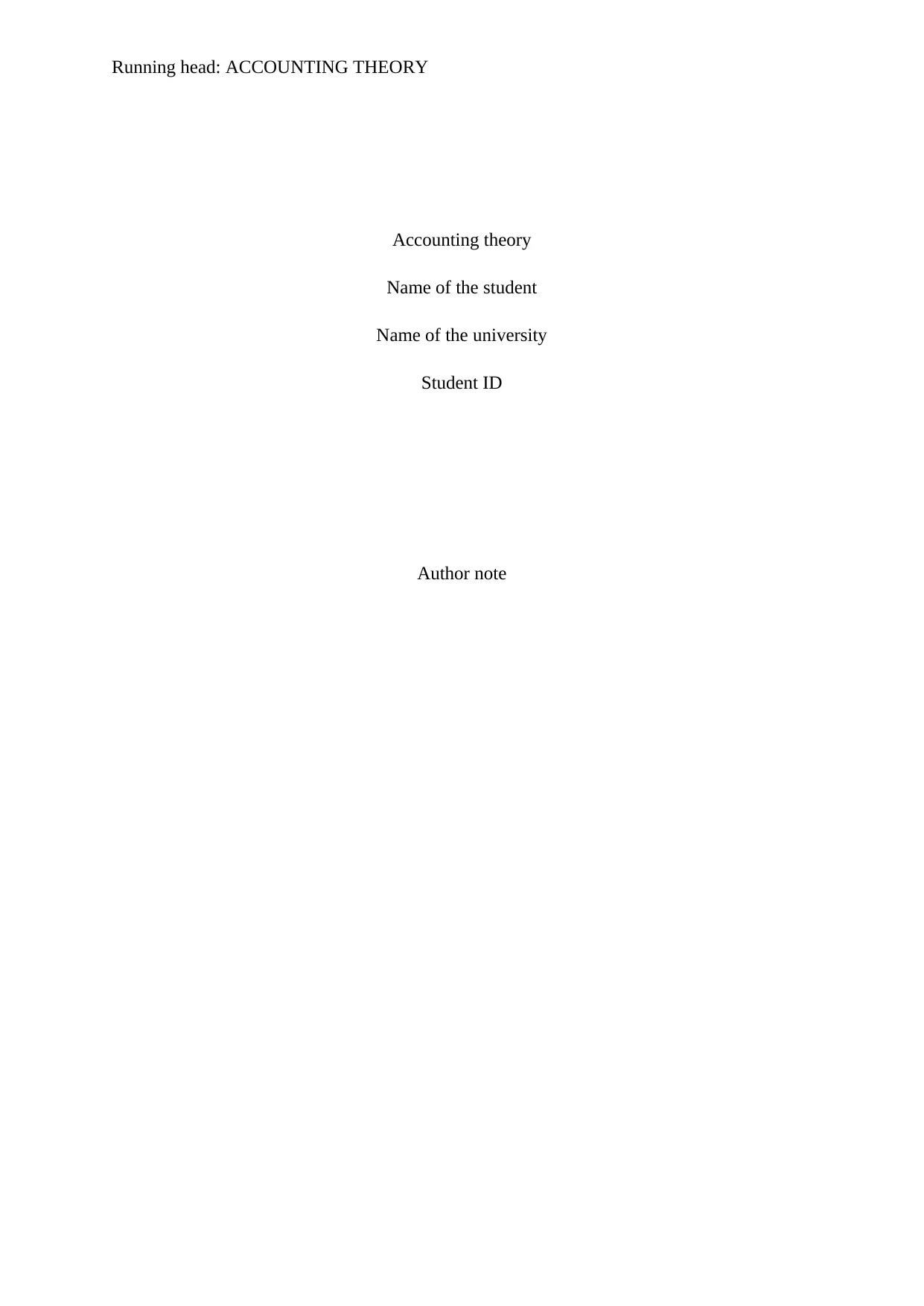
Running head: ACCOUNTING THEORY
Accounting theory
Name of the student
Name of the university
Student ID
Author note
Accounting theory
Name of the student
Name of the university
Student ID
Author note
Secure Best Marks with AI Grader
Need help grading? Try our AI Grader for instant feedback on your assignments.
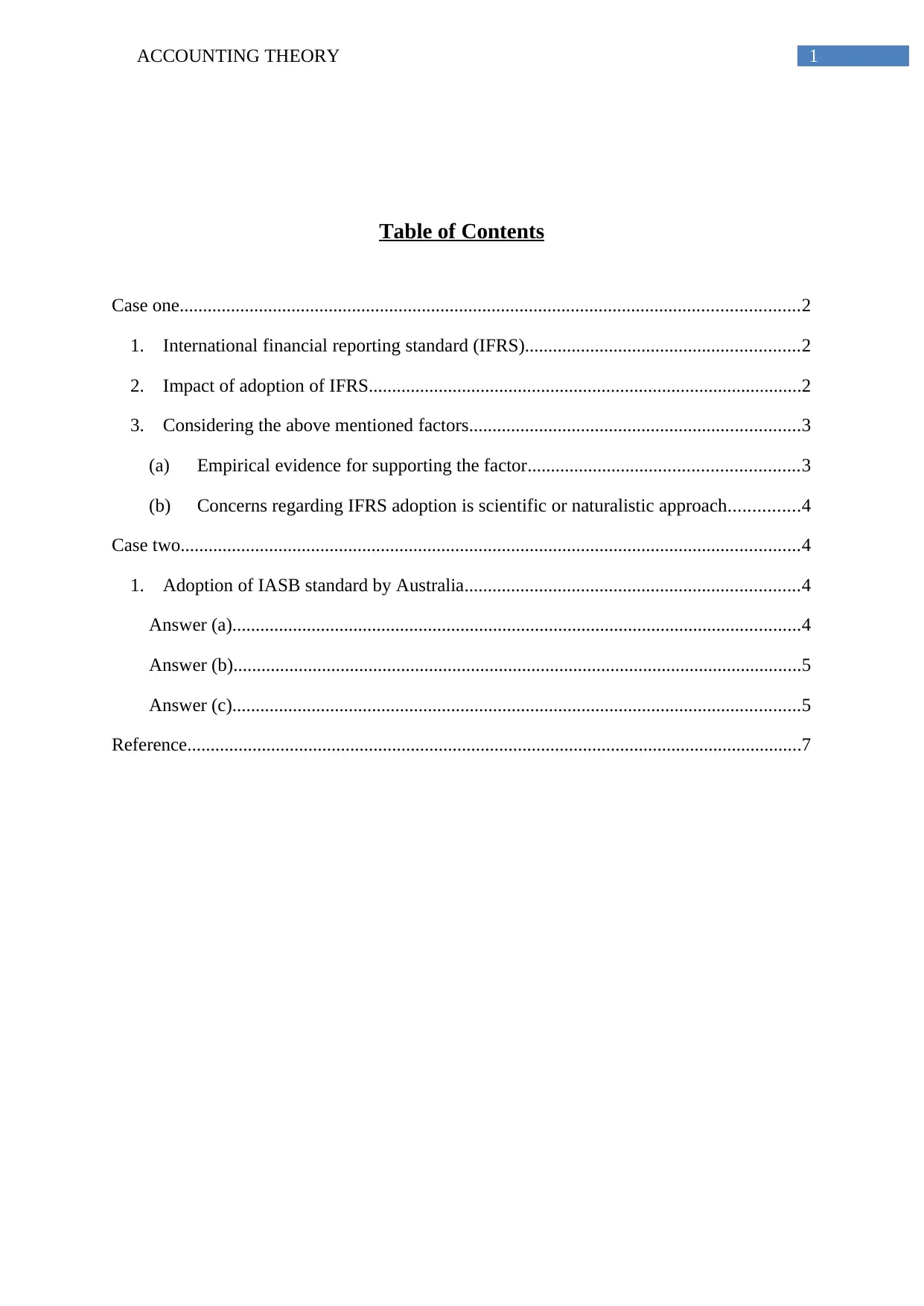
1ACCOUNTING THEORY
Table of Contents
Case one.....................................................................................................................................2
1. International financial reporting standard (IFRS)...........................................................2
2. Impact of adoption of IFRS.............................................................................................2
3. Considering the above mentioned factors.......................................................................3
(a) Empirical evidence for supporting the factor..........................................................3
(b) Concerns regarding IFRS adoption is scientific or naturalistic approach...............4
Case two.....................................................................................................................................4
1. Adoption of IASB standard by Australia........................................................................4
Answer (a)..........................................................................................................................4
Answer (b)..........................................................................................................................5
Answer (c)..........................................................................................................................5
Reference....................................................................................................................................7
Table of Contents
Case one.....................................................................................................................................2
1. International financial reporting standard (IFRS)...........................................................2
2. Impact of adoption of IFRS.............................................................................................2
3. Considering the above mentioned factors.......................................................................3
(a) Empirical evidence for supporting the factor..........................................................3
(b) Concerns regarding IFRS adoption is scientific or naturalistic approach...............4
Case two.....................................................................................................................................4
1. Adoption of IASB standard by Australia........................................................................4
Answer (a)..........................................................................................................................4
Answer (b)..........................................................................................................................5
Answer (c)..........................................................................................................................5
Reference....................................................................................................................................7
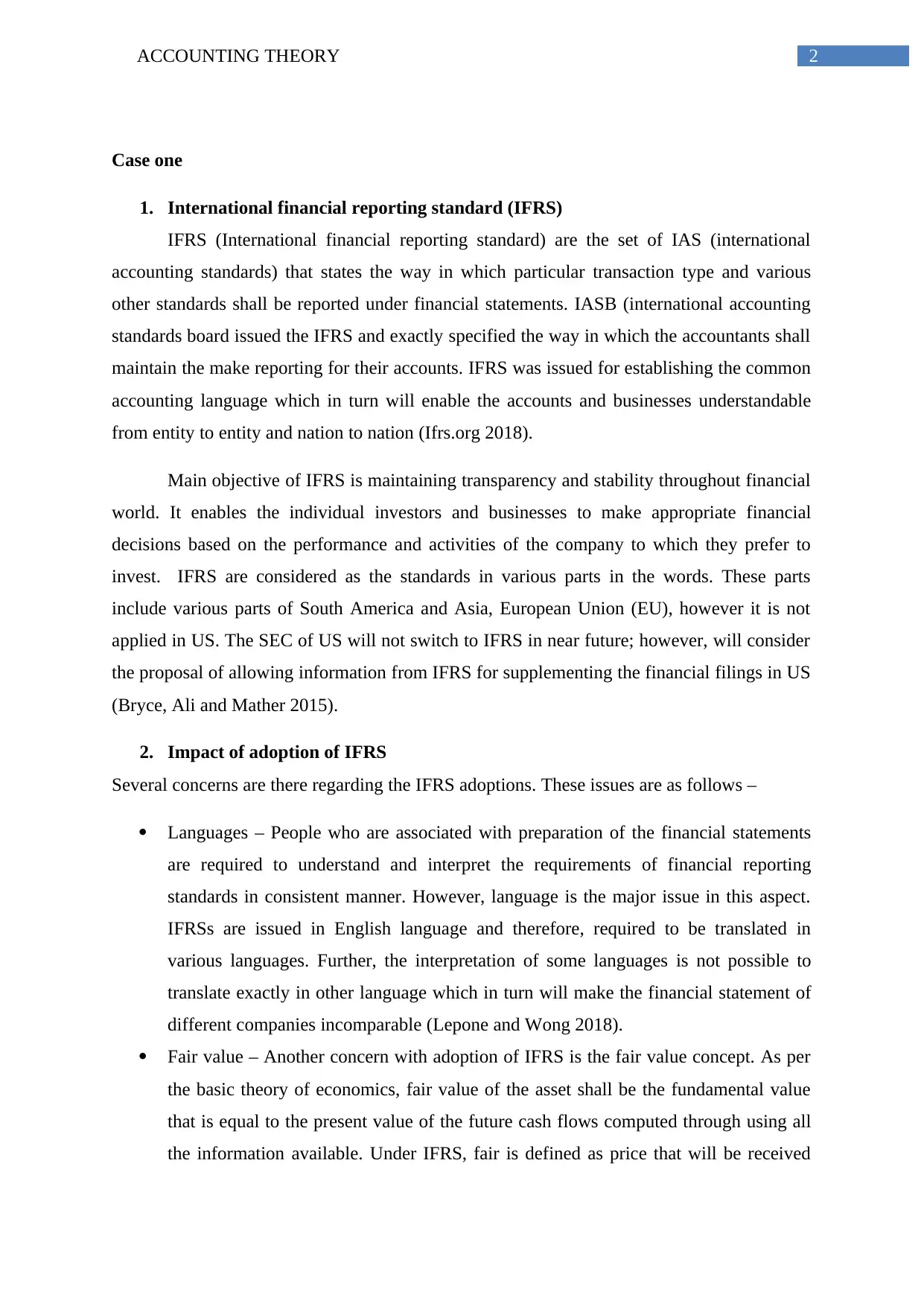
2ACCOUNTING THEORY
Case one
1. International financial reporting standard (IFRS)
IFRS (International financial reporting standard) are the set of IAS (international
accounting standards) that states the way in which particular transaction type and various
other standards shall be reported under financial statements. IASB (international accounting
standards board issued the IFRS and exactly specified the way in which the accountants shall
maintain the make reporting for their accounts. IFRS was issued for establishing the common
accounting language which in turn will enable the accounts and businesses understandable
from entity to entity and nation to nation (Ifrs.org 2018).
Main objective of IFRS is maintaining transparency and stability throughout financial
world. It enables the individual investors and businesses to make appropriate financial
decisions based on the performance and activities of the company to which they prefer to
invest. IFRS are considered as the standards in various parts in the words. These parts
include various parts of South America and Asia, European Union (EU), however it is not
applied in US. The SEC of US will not switch to IFRS in near future; however, will consider
the proposal of allowing information from IFRS for supplementing the financial filings in US
(Bryce, Ali and Mather 2015).
2. Impact of adoption of IFRS
Several concerns are there regarding the IFRS adoptions. These issues are as follows –
Languages – People who are associated with preparation of the financial statements
are required to understand and interpret the requirements of financial reporting
standards in consistent manner. However, language is the major issue in this aspect.
IFRSs are issued in English language and therefore, required to be translated in
various languages. Further, the interpretation of some languages is not possible to
translate exactly in other language which in turn will make the financial statement of
different companies incomparable (Lepone and Wong 2018).
Fair value – Another concern with adoption of IFRS is the fair value concept. As per
the basic theory of economics, fair value of the asset shall be the fundamental value
that is equal to the present value of the future cash flows computed through using all
the information available. Under IFRS, fair is defined as price that will be received
Case one
1. International financial reporting standard (IFRS)
IFRS (International financial reporting standard) are the set of IAS (international
accounting standards) that states the way in which particular transaction type and various
other standards shall be reported under financial statements. IASB (international accounting
standards board issued the IFRS and exactly specified the way in which the accountants shall
maintain the make reporting for their accounts. IFRS was issued for establishing the common
accounting language which in turn will enable the accounts and businesses understandable
from entity to entity and nation to nation (Ifrs.org 2018).
Main objective of IFRS is maintaining transparency and stability throughout financial
world. It enables the individual investors and businesses to make appropriate financial
decisions based on the performance and activities of the company to which they prefer to
invest. IFRS are considered as the standards in various parts in the words. These parts
include various parts of South America and Asia, European Union (EU), however it is not
applied in US. The SEC of US will not switch to IFRS in near future; however, will consider
the proposal of allowing information from IFRS for supplementing the financial filings in US
(Bryce, Ali and Mather 2015).
2. Impact of adoption of IFRS
Several concerns are there regarding the IFRS adoptions. These issues are as follows –
Languages – People who are associated with preparation of the financial statements
are required to understand and interpret the requirements of financial reporting
standards in consistent manner. However, language is the major issue in this aspect.
IFRSs are issued in English language and therefore, required to be translated in
various languages. Further, the interpretation of some languages is not possible to
translate exactly in other language which in turn will make the financial statement of
different companies incomparable (Lepone and Wong 2018).
Fair value – Another concern with adoption of IFRS is the fair value concept. As per
the basic theory of economics, fair value of the asset shall be the fundamental value
that is equal to the present value of the future cash flows computed through using all
the information available. Under IFRS, fair is defined as price that will be received
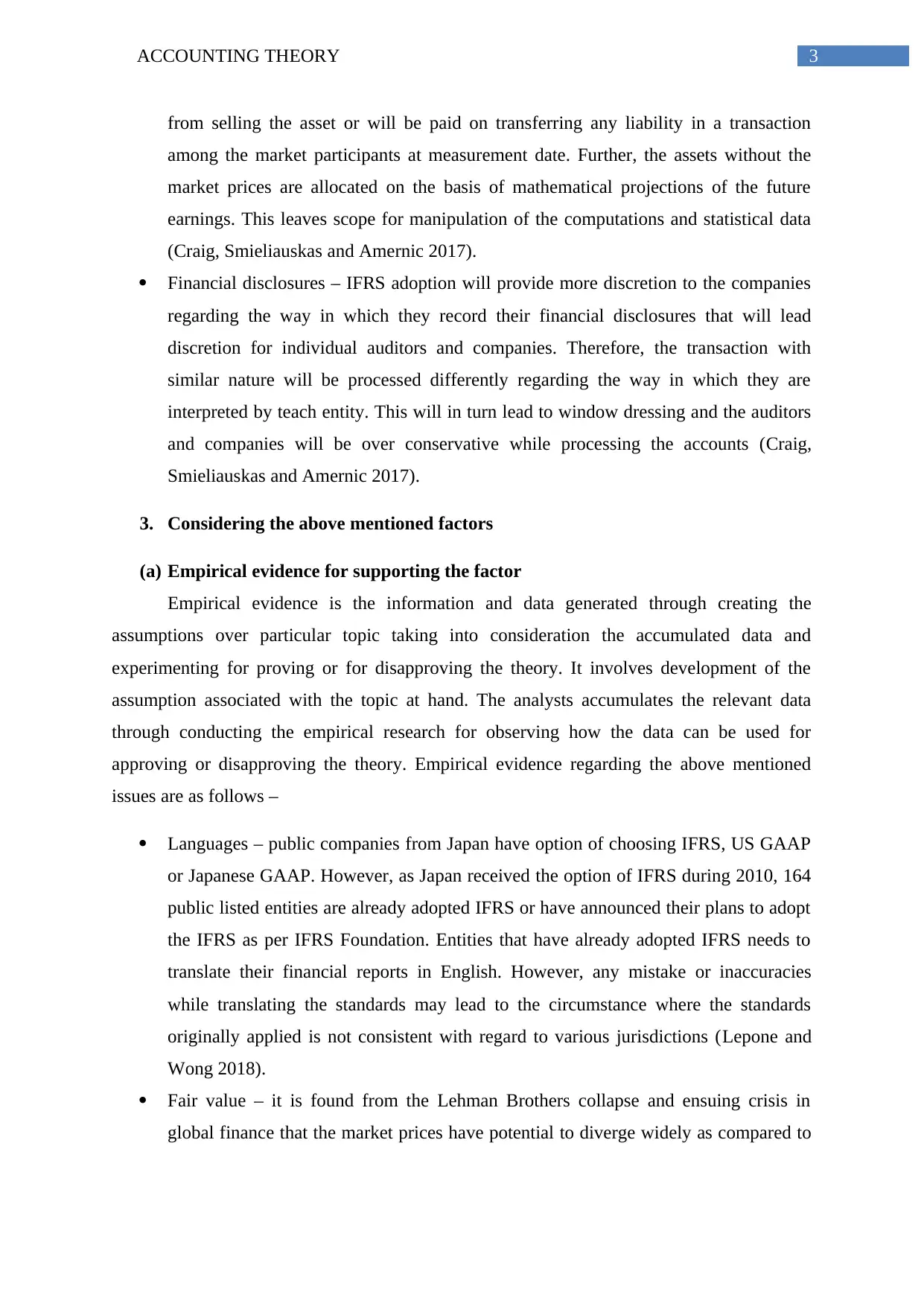
3ACCOUNTING THEORY
from selling the asset or will be paid on transferring any liability in a transaction
among the market participants at measurement date. Further, the assets without the
market prices are allocated on the basis of mathematical projections of the future
earnings. This leaves scope for manipulation of the computations and statistical data
(Craig, Smieliauskas and Amernic 2017).
Financial disclosures – IFRS adoption will provide more discretion to the companies
regarding the way in which they record their financial disclosures that will lead
discretion for individual auditors and companies. Therefore, the transaction with
similar nature will be processed differently regarding the way in which they are
interpreted by teach entity. This will in turn lead to window dressing and the auditors
and companies will be over conservative while processing the accounts (Craig,
Smieliauskas and Amernic 2017).
3. Considering the above mentioned factors
(a) Empirical evidence for supporting the factor
Empirical evidence is the information and data generated through creating the
assumptions over particular topic taking into consideration the accumulated data and
experimenting for proving or for disapproving the theory. It involves development of the
assumption associated with the topic at hand. The analysts accumulates the relevant data
through conducting the empirical research for observing how the data can be used for
approving or disapproving the theory. Empirical evidence regarding the above mentioned
issues are as follows –
Languages – public companies from Japan have option of choosing IFRS, US GAAP
or Japanese GAAP. However, as Japan received the option of IFRS during 2010, 164
public listed entities are already adopted IFRS or have announced their plans to adopt
the IFRS as per IFRS Foundation. Entities that have already adopted IFRS needs to
translate their financial reports in English. However, any mistake or inaccuracies
while translating the standards may lead to the circumstance where the standards
originally applied is not consistent with regard to various jurisdictions (Lepone and
Wong 2018).
Fair value – it is found from the Lehman Brothers collapse and ensuing crisis in
global finance that the market prices have potential to diverge widely as compared to
from selling the asset or will be paid on transferring any liability in a transaction
among the market participants at measurement date. Further, the assets without the
market prices are allocated on the basis of mathematical projections of the future
earnings. This leaves scope for manipulation of the computations and statistical data
(Craig, Smieliauskas and Amernic 2017).
Financial disclosures – IFRS adoption will provide more discretion to the companies
regarding the way in which they record their financial disclosures that will lead
discretion for individual auditors and companies. Therefore, the transaction with
similar nature will be processed differently regarding the way in which they are
interpreted by teach entity. This will in turn lead to window dressing and the auditors
and companies will be over conservative while processing the accounts (Craig,
Smieliauskas and Amernic 2017).
3. Considering the above mentioned factors
(a) Empirical evidence for supporting the factor
Empirical evidence is the information and data generated through creating the
assumptions over particular topic taking into consideration the accumulated data and
experimenting for proving or for disapproving the theory. It involves development of the
assumption associated with the topic at hand. The analysts accumulates the relevant data
through conducting the empirical research for observing how the data can be used for
approving or disapproving the theory. Empirical evidence regarding the above mentioned
issues are as follows –
Languages – public companies from Japan have option of choosing IFRS, US GAAP
or Japanese GAAP. However, as Japan received the option of IFRS during 2010, 164
public listed entities are already adopted IFRS or have announced their plans to adopt
the IFRS as per IFRS Foundation. Entities that have already adopted IFRS needs to
translate their financial reports in English. However, any mistake or inaccuracies
while translating the standards may lead to the circumstance where the standards
originally applied is not consistent with regard to various jurisdictions (Lepone and
Wong 2018).
Fair value – it is found from the Lehman Brothers collapse and ensuing crisis in
global finance that the market prices have potential to diverge widely as compared to
Secure Best Marks with AI Grader
Need help grading? Try our AI Grader for instant feedback on your assignments.
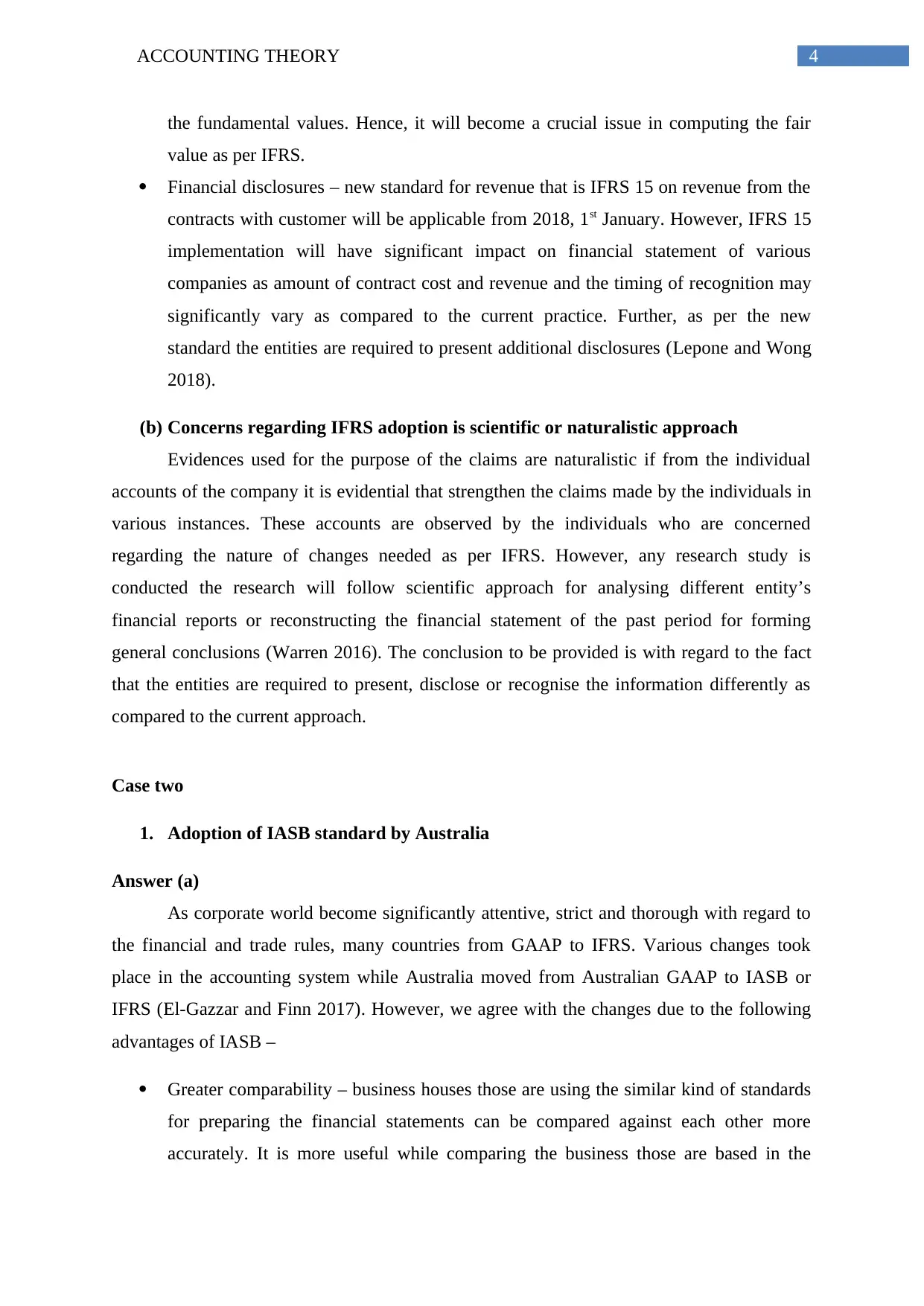
4ACCOUNTING THEORY
the fundamental values. Hence, it will become a crucial issue in computing the fair
value as per IFRS.
Financial disclosures – new standard for revenue that is IFRS 15 on revenue from the
contracts with customer will be applicable from 2018, 1st January. However, IFRS 15
implementation will have significant impact on financial statement of various
companies as amount of contract cost and revenue and the timing of recognition may
significantly vary as compared to the current practice. Further, as per the new
standard the entities are required to present additional disclosures (Lepone and Wong
2018).
(b) Concerns regarding IFRS adoption is scientific or naturalistic approach
Evidences used for the purpose of the claims are naturalistic if from the individual
accounts of the company it is evidential that strengthen the claims made by the individuals in
various instances. These accounts are observed by the individuals who are concerned
regarding the nature of changes needed as per IFRS. However, any research study is
conducted the research will follow scientific approach for analysing different entity’s
financial reports or reconstructing the financial statement of the past period for forming
general conclusions (Warren 2016). The conclusion to be provided is with regard to the fact
that the entities are required to present, disclose or recognise the information differently as
compared to the current approach.
Case two
1. Adoption of IASB standard by Australia
Answer (a)
As corporate world become significantly attentive, strict and thorough with regard to
the financial and trade rules, many countries from GAAP to IFRS. Various changes took
place in the accounting system while Australia moved from Australian GAAP to IASB or
IFRS (El-Gazzar and Finn 2017). However, we agree with the changes due to the following
advantages of IASB –
Greater comparability – business houses those are using the similar kind of standards
for preparing the financial statements can be compared against each other more
accurately. It is more useful while comparing the business those are based in the
the fundamental values. Hence, it will become a crucial issue in computing the fair
value as per IFRS.
Financial disclosures – new standard for revenue that is IFRS 15 on revenue from the
contracts with customer will be applicable from 2018, 1st January. However, IFRS 15
implementation will have significant impact on financial statement of various
companies as amount of contract cost and revenue and the timing of recognition may
significantly vary as compared to the current practice. Further, as per the new
standard the entities are required to present additional disclosures (Lepone and Wong
2018).
(b) Concerns regarding IFRS adoption is scientific or naturalistic approach
Evidences used for the purpose of the claims are naturalistic if from the individual
accounts of the company it is evidential that strengthen the claims made by the individuals in
various instances. These accounts are observed by the individuals who are concerned
regarding the nature of changes needed as per IFRS. However, any research study is
conducted the research will follow scientific approach for analysing different entity’s
financial reports or reconstructing the financial statement of the past period for forming
general conclusions (Warren 2016). The conclusion to be provided is with regard to the fact
that the entities are required to present, disclose or recognise the information differently as
compared to the current approach.
Case two
1. Adoption of IASB standard by Australia
Answer (a)
As corporate world become significantly attentive, strict and thorough with regard to
the financial and trade rules, many countries from GAAP to IFRS. Various changes took
place in the accounting system while Australia moved from Australian GAAP to IASB or
IFRS (El-Gazzar and Finn 2017). However, we agree with the changes due to the following
advantages of IASB –
Greater comparability – business houses those are using the similar kind of standards
for preparing the financial statements can be compared against each other more
accurately. It is more useful while comparing the business those are based in the
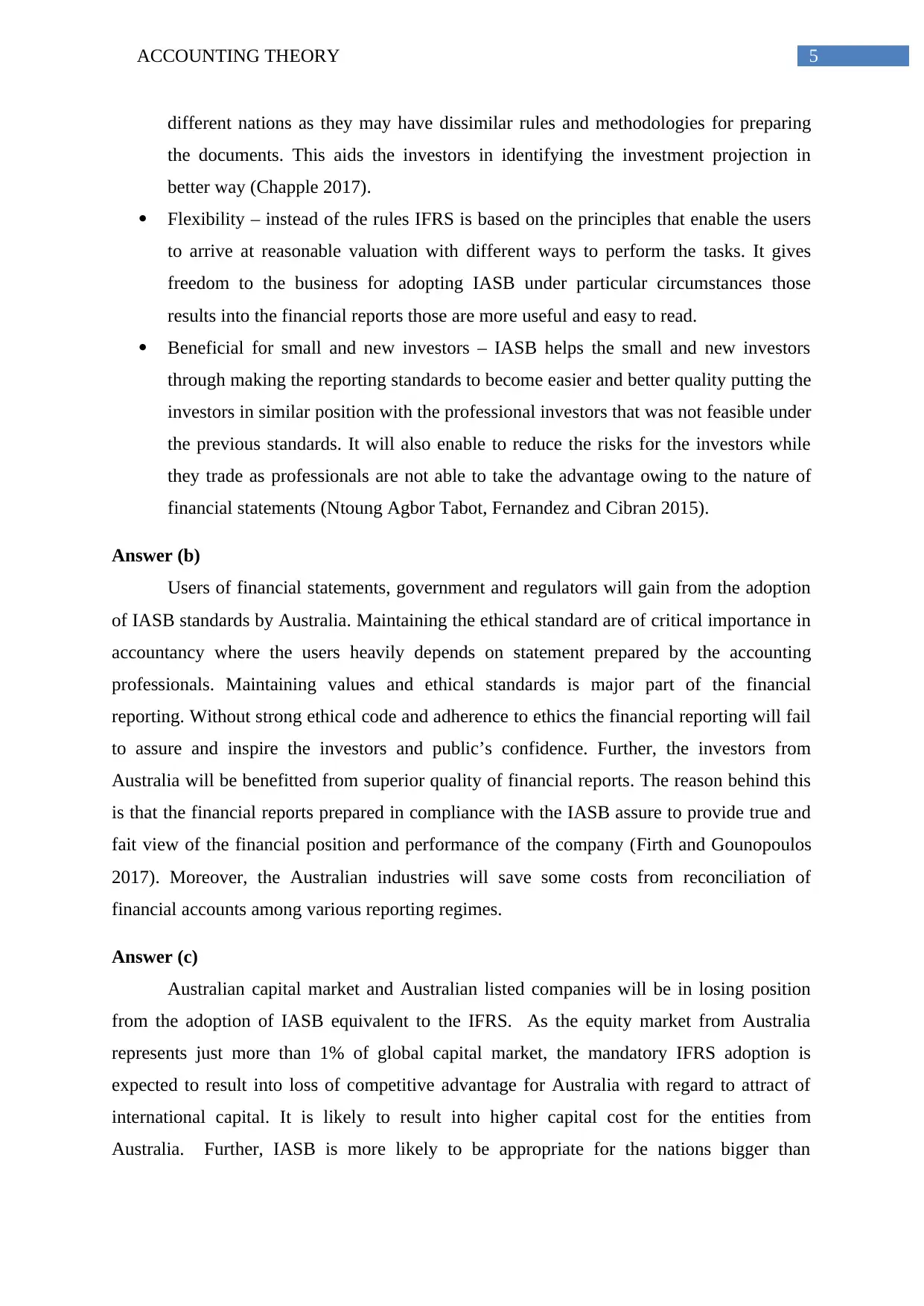
5ACCOUNTING THEORY
different nations as they may have dissimilar rules and methodologies for preparing
the documents. This aids the investors in identifying the investment projection in
better way (Chapple 2017).
Flexibility – instead of the rules IFRS is based on the principles that enable the users
to arrive at reasonable valuation with different ways to perform the tasks. It gives
freedom to the business for adopting IASB under particular circumstances those
results into the financial reports those are more useful and easy to read.
Beneficial for small and new investors – IASB helps the small and new investors
through making the reporting standards to become easier and better quality putting the
investors in similar position with the professional investors that was not feasible under
the previous standards. It will also enable to reduce the risks for the investors while
they trade as professionals are not able to take the advantage owing to the nature of
financial statements (Ntoung Agbor Tabot, Fernandez and Cibran 2015).
Answer (b)
Users of financial statements, government and regulators will gain from the adoption
of IASB standards by Australia. Maintaining the ethical standard are of critical importance in
accountancy where the users heavily depends on statement prepared by the accounting
professionals. Maintaining values and ethical standards is major part of the financial
reporting. Without strong ethical code and adherence to ethics the financial reporting will fail
to assure and inspire the investors and public’s confidence. Further, the investors from
Australia will be benefitted from superior quality of financial reports. The reason behind this
is that the financial reports prepared in compliance with the IASB assure to provide true and
fait view of the financial position and performance of the company (Firth and Gounopoulos
2017). Moreover, the Australian industries will save some costs from reconciliation of
financial accounts among various reporting regimes.
Answer (c)
Australian capital market and Australian listed companies will be in losing position
from the adoption of IASB equivalent to the IFRS. As the equity market from Australia
represents just more than 1% of global capital market, the mandatory IFRS adoption is
expected to result into loss of competitive advantage for Australia with regard to attract of
international capital. It is likely to result into higher capital cost for the entities from
Australia. Further, IASB is more likely to be appropriate for the nations bigger than
different nations as they may have dissimilar rules and methodologies for preparing
the documents. This aids the investors in identifying the investment projection in
better way (Chapple 2017).
Flexibility – instead of the rules IFRS is based on the principles that enable the users
to arrive at reasonable valuation with different ways to perform the tasks. It gives
freedom to the business for adopting IASB under particular circumstances those
results into the financial reports those are more useful and easy to read.
Beneficial for small and new investors – IASB helps the small and new investors
through making the reporting standards to become easier and better quality putting the
investors in similar position with the professional investors that was not feasible under
the previous standards. It will also enable to reduce the risks for the investors while
they trade as professionals are not able to take the advantage owing to the nature of
financial statements (Ntoung Agbor Tabot, Fernandez and Cibran 2015).
Answer (b)
Users of financial statements, government and regulators will gain from the adoption
of IASB standards by Australia. Maintaining the ethical standard are of critical importance in
accountancy where the users heavily depends on statement prepared by the accounting
professionals. Maintaining values and ethical standards is major part of the financial
reporting. Without strong ethical code and adherence to ethics the financial reporting will fail
to assure and inspire the investors and public’s confidence. Further, the investors from
Australia will be benefitted from superior quality of financial reports. The reason behind this
is that the financial reports prepared in compliance with the IASB assure to provide true and
fait view of the financial position and performance of the company (Firth and Gounopoulos
2017). Moreover, the Australian industries will save some costs from reconciliation of
financial accounts among various reporting regimes.
Answer (c)
Australian capital market and Australian listed companies will be in losing position
from the adoption of IASB equivalent to the IFRS. As the equity market from Australia
represents just more than 1% of global capital market, the mandatory IFRS adoption is
expected to result into loss of competitive advantage for Australia with regard to attract of
international capital. It is likely to result into higher capital cost for the entities from
Australia. Further, IASB is more likely to be appropriate for the nations bigger than
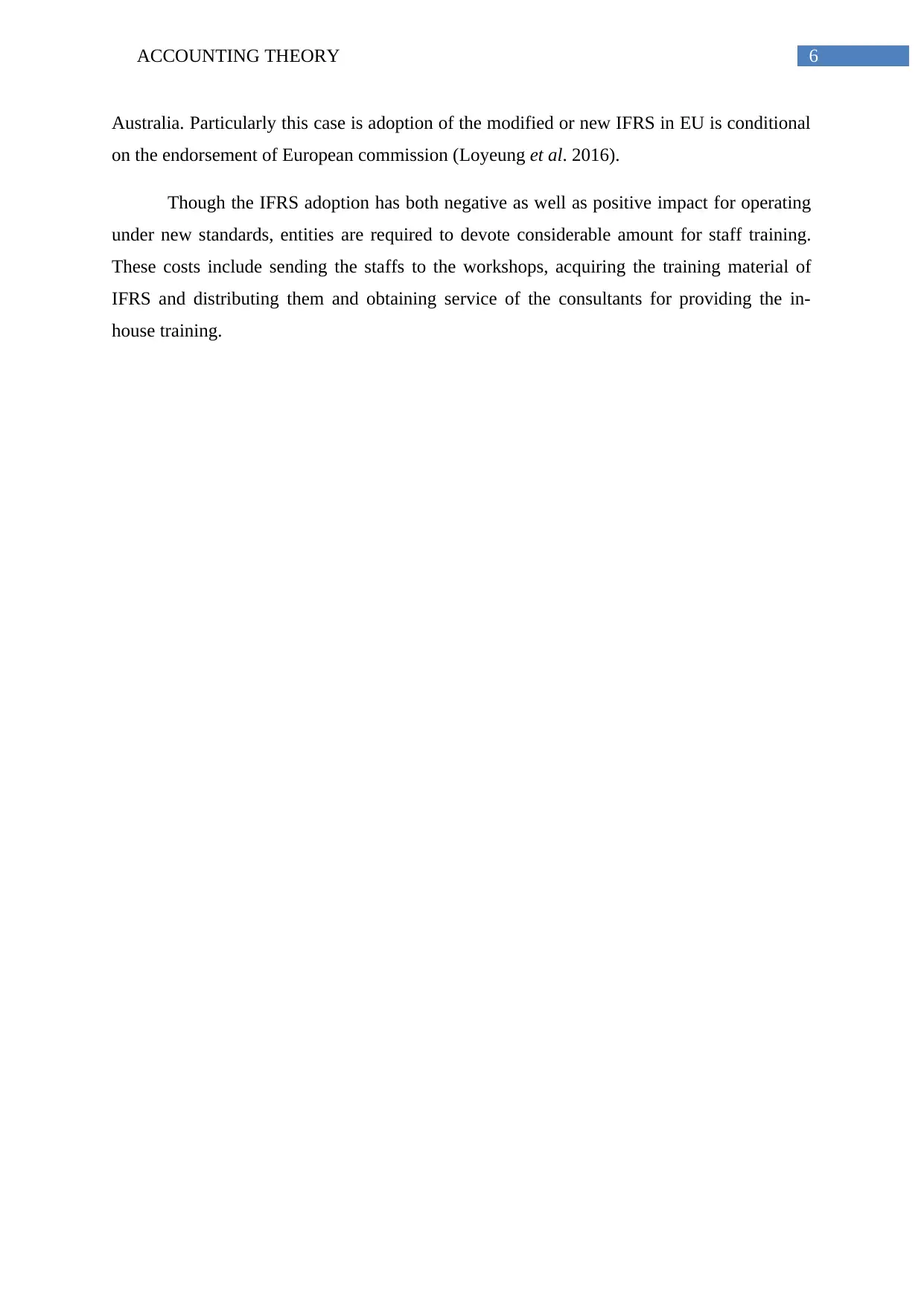
6ACCOUNTING THEORY
Australia. Particularly this case is adoption of the modified or new IFRS in EU is conditional
on the endorsement of European commission (Loyeung et al. 2016).
Though the IFRS adoption has both negative as well as positive impact for operating
under new standards, entities are required to devote considerable amount for staff training.
These costs include sending the staffs to the workshops, acquiring the training material of
IFRS and distributing them and obtaining service of the consultants for providing the in-
house training.
Australia. Particularly this case is adoption of the modified or new IFRS in EU is conditional
on the endorsement of European commission (Loyeung et al. 2016).
Though the IFRS adoption has both negative as well as positive impact for operating
under new standards, entities are required to devote considerable amount for staff training.
These costs include sending the staffs to the workshops, acquiring the training material of
IFRS and distributing them and obtaining service of the consultants for providing the in-
house training.
Paraphrase This Document
Need a fresh take? Get an instant paraphrase of this document with our AI Paraphraser
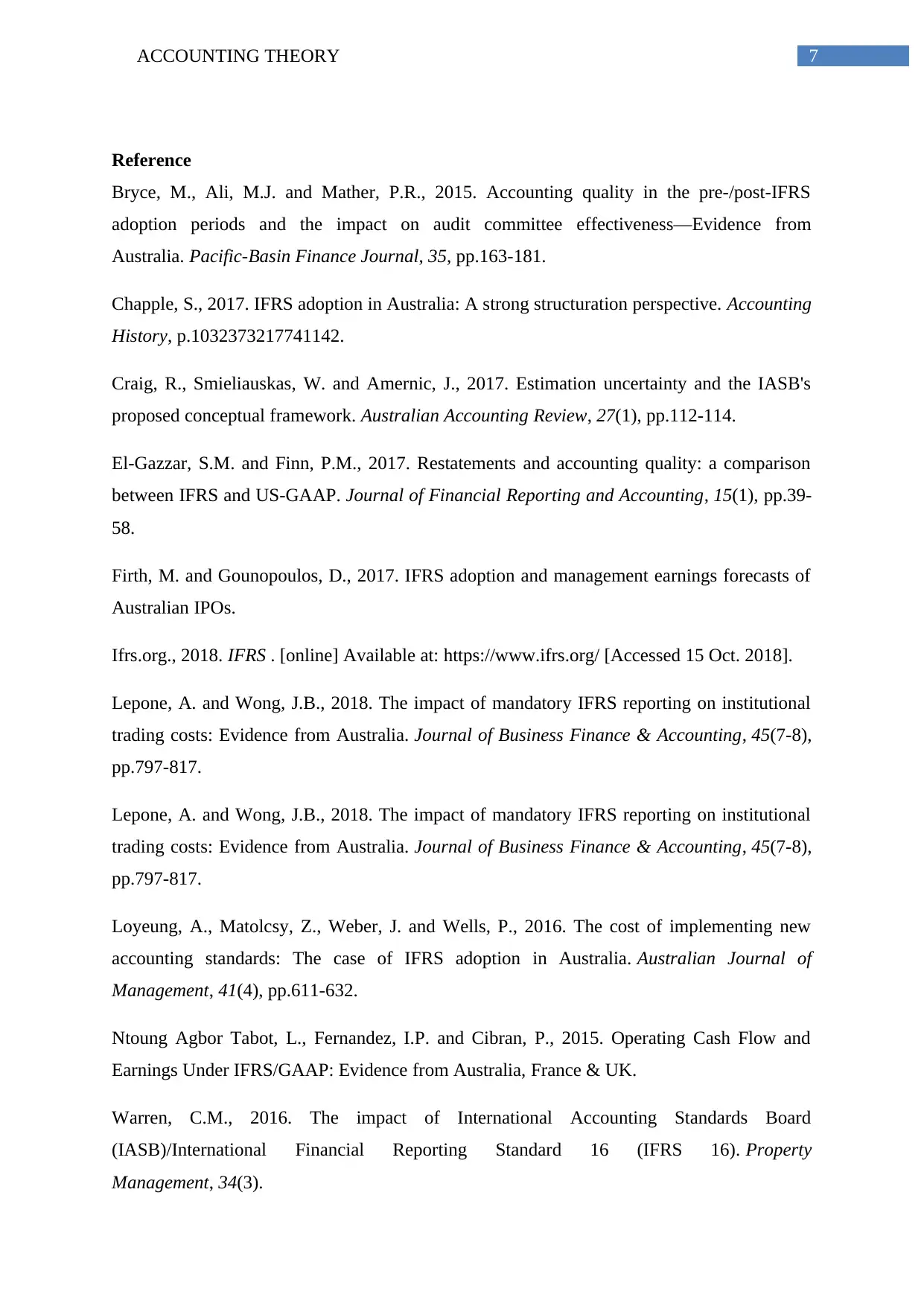
7ACCOUNTING THEORY
Reference
Bryce, M., Ali, M.J. and Mather, P.R., 2015. Accounting quality in the pre-/post-IFRS
adoption periods and the impact on audit committee effectiveness—Evidence from
Australia. Pacific-Basin Finance Journal, 35, pp.163-181.
Chapple, S., 2017. IFRS adoption in Australia: A strong structuration perspective. Accounting
History, p.1032373217741142.
Craig, R., Smieliauskas, W. and Amernic, J., 2017. Estimation uncertainty and the IASB's
proposed conceptual framework. Australian Accounting Review, 27(1), pp.112-114.
El-Gazzar, S.M. and Finn, P.M., 2017. Restatements and accounting quality: a comparison
between IFRS and US-GAAP. Journal of Financial Reporting and Accounting, 15(1), pp.39-
58.
Firth, M. and Gounopoulos, D., 2017. IFRS adoption and management earnings forecasts of
Australian IPOs.
Ifrs.org., 2018. IFRS . [online] Available at: https://www.ifrs.org/ [Accessed 15 Oct. 2018].
Lepone, A. and Wong, J.B., 2018. The impact of mandatory IFRS reporting on institutional
trading costs: Evidence from Australia. Journal of Business Finance & Accounting, 45(7-8),
pp.797-817.
Lepone, A. and Wong, J.B., 2018. The impact of mandatory IFRS reporting on institutional
trading costs: Evidence from Australia. Journal of Business Finance & Accounting, 45(7-8),
pp.797-817.
Loyeung, A., Matolcsy, Z., Weber, J. and Wells, P., 2016. The cost of implementing new
accounting standards: The case of IFRS adoption in Australia. Australian Journal of
Management, 41(4), pp.611-632.
Ntoung Agbor Tabot, L., Fernandez, I.P. and Cibran, P., 2015. Operating Cash Flow and
Earnings Under IFRS/GAAP: Evidence from Australia, France & UK.
Warren, C.M., 2016. The impact of International Accounting Standards Board
(IASB)/International Financial Reporting Standard 16 (IFRS 16). Property
Management, 34(3).
Reference
Bryce, M., Ali, M.J. and Mather, P.R., 2015. Accounting quality in the pre-/post-IFRS
adoption periods and the impact on audit committee effectiveness—Evidence from
Australia. Pacific-Basin Finance Journal, 35, pp.163-181.
Chapple, S., 2017. IFRS adoption in Australia: A strong structuration perspective. Accounting
History, p.1032373217741142.
Craig, R., Smieliauskas, W. and Amernic, J., 2017. Estimation uncertainty and the IASB's
proposed conceptual framework. Australian Accounting Review, 27(1), pp.112-114.
El-Gazzar, S.M. and Finn, P.M., 2017. Restatements and accounting quality: a comparison
between IFRS and US-GAAP. Journal of Financial Reporting and Accounting, 15(1), pp.39-
58.
Firth, M. and Gounopoulos, D., 2017. IFRS adoption and management earnings forecasts of
Australian IPOs.
Ifrs.org., 2018. IFRS . [online] Available at: https://www.ifrs.org/ [Accessed 15 Oct. 2018].
Lepone, A. and Wong, J.B., 2018. The impact of mandatory IFRS reporting on institutional
trading costs: Evidence from Australia. Journal of Business Finance & Accounting, 45(7-8),
pp.797-817.
Lepone, A. and Wong, J.B., 2018. The impact of mandatory IFRS reporting on institutional
trading costs: Evidence from Australia. Journal of Business Finance & Accounting, 45(7-8),
pp.797-817.
Loyeung, A., Matolcsy, Z., Weber, J. and Wells, P., 2016. The cost of implementing new
accounting standards: The case of IFRS adoption in Australia. Australian Journal of
Management, 41(4), pp.611-632.
Ntoung Agbor Tabot, L., Fernandez, I.P. and Cibran, P., 2015. Operating Cash Flow and
Earnings Under IFRS/GAAP: Evidence from Australia, France & UK.
Warren, C.M., 2016. The impact of International Accounting Standards Board
(IASB)/International Financial Reporting Standard 16 (IFRS 16). Property
Management, 34(3).

8ACCOUNTING THEORY
1 out of 9
Related Documents
Your All-in-One AI-Powered Toolkit for Academic Success.
+13062052269
info@desklib.com
Available 24*7 on WhatsApp / Email
![[object Object]](/_next/static/media/star-bottom.7253800d.svg)
Unlock your academic potential
© 2024 | Zucol Services PVT LTD | All rights reserved.





